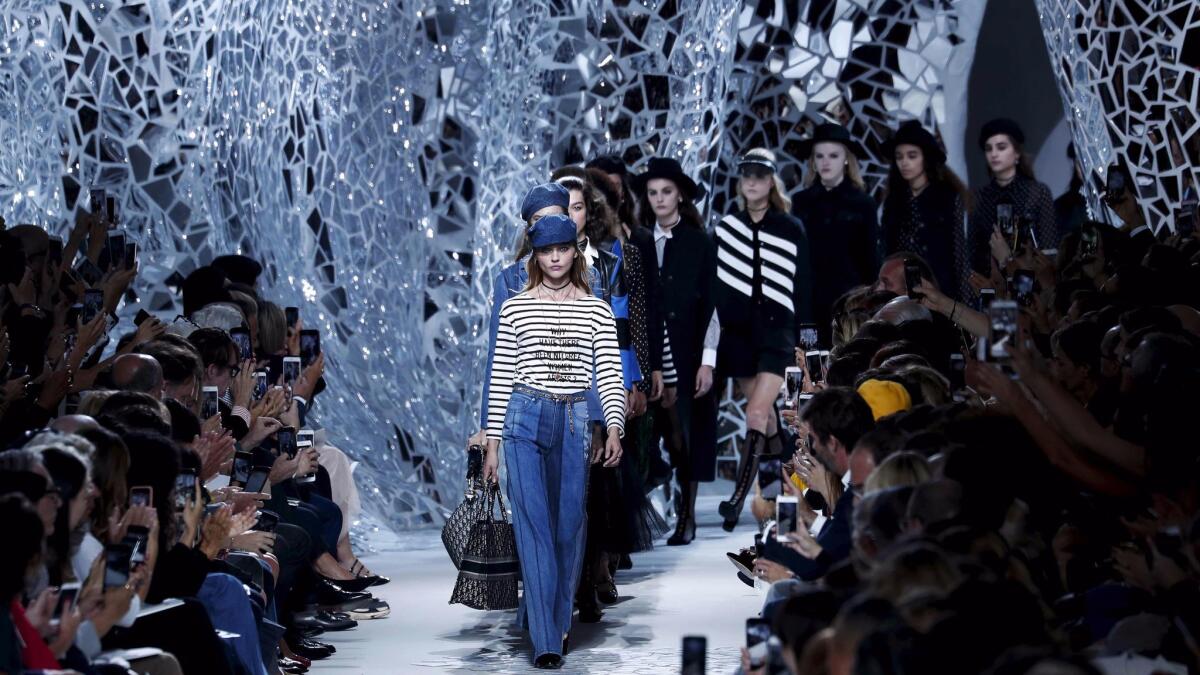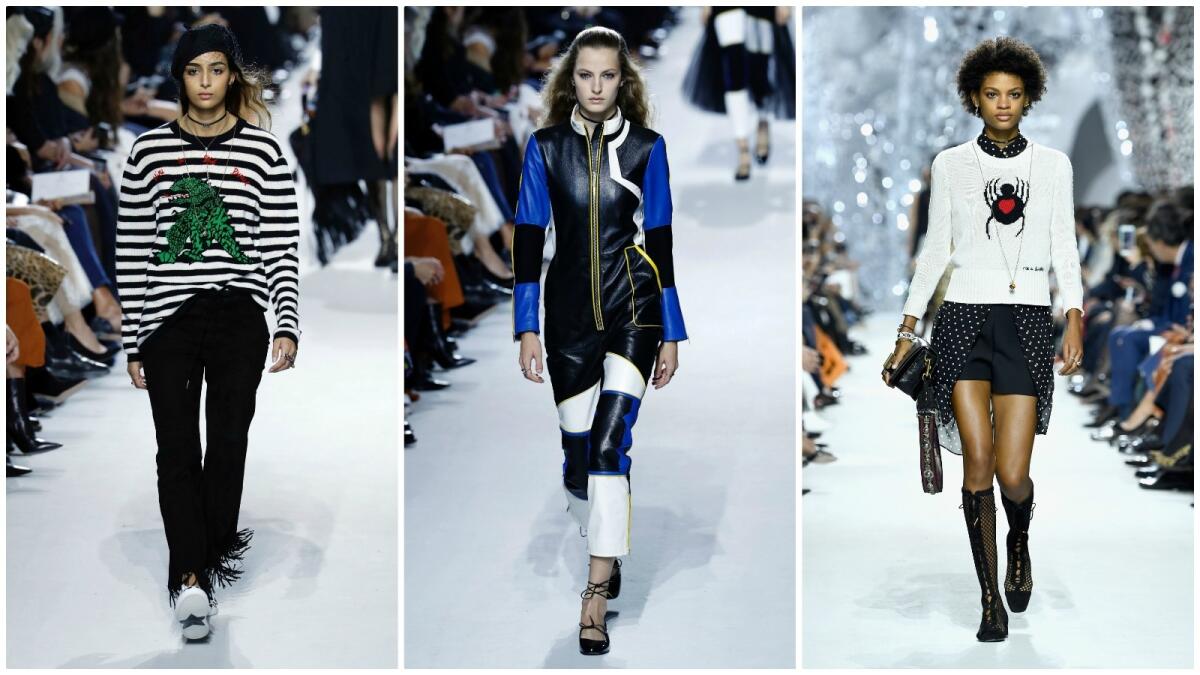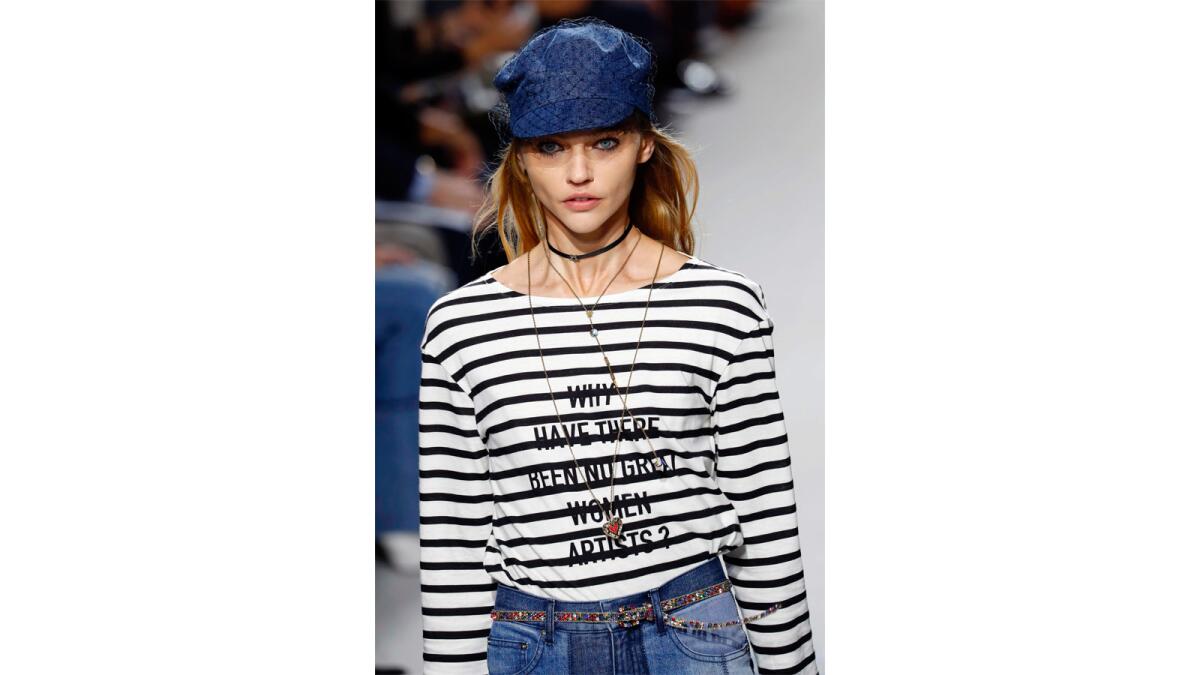Dior doubles — make that triples — down on feminism for spring 2018

- Share via
Reporting from Paris — It was barely early afternoon on the first full day of Paris Fashion Week but every thumb and finger within reach of a smartphone was already in danger of overuse thanks to Maria Grazia Chiuri’s spring and summer 2018 ready-to-wear collection for Dior.
It wasn’t just the Snapchatting, Instagramming and tweeting of every last look that came down the runway (though, to be sure, there was plenty of that) that threatened serious digit damage, but web-searching the inspirations name-checked in the artistic director’s show notes, including artist Niki de Saint Phalle (a French American artist known for monumental sculptures) and art historian Linda Nochlin, whose essay “Why Have There Been No Great Women Artists?” was placed (in its 36-page entirety) at each seat.
The question posed in Nochlin’s essay is certainly a provocative one — just as it was (and was meant to be) when it was originally published in 1971 — and here it does double duty, affording Grazia Chiuri another opportunity to continue the feminist dialogue she started with her first collection for the house a year ago as well as highlight a great female artist whose work and personal style served as the collection’s inspiration.
De Saint Phalle, according to the show notes, was a close friend of Marc Bohan, the designer who helmed Christian Dior from 1960 until 1989, and the collection draws on her sense of style as reflected in photos of her from the label’s archives taken during his tenure. “Embodying the beauty of her time, more adolescent than androgynous, small and fiery,” read the show notes, “she exhibits a style of dressing that’s both iconic and personal, and current in its proportions and whimsy.”

That meant the bustiers, berets, tulle and tarot-card references familiar from the last two collections — which reappeared on the runway here Tuesday to some extent — were right at home, particularly because some of the colorful embroidered designs and mirrored mosaic work (the latter appearing on the walls and floors of the venue as well) were inspired by the artist’s Tarot Garden sculpture installation in the Tuscany region of Italy.
The first look down the runway — a pair of high-waisted, flare-legged jeans with a Breton-striped top — had the title question from Nolchin’s essay emblazoned across the chest, a sure conversation-starter if ever there was one. But the slogan shirt turned out to be the exception, not the rule, and what followed was a whimsical, colorful whirl of fire-breathing dragons embroidered onto mesh-like tops, fork-tongued beasts painted onto leather skirts (the word “positive” under the colorful beast over the right thigh; “negative” under a black-and-red one on the left thigh), cartoon hearts floating freely across diaphanous fabrics, and a contingent of scarabs, winged angels and female forms embroidered across the fronts of dresses and tops.
There were also some pieces with a distinct racing vibe to them — particularly a color-blocked leather jumpsuit that resembled one a race-car driver would wear and a range of looks in a black-and-white checkered flag pattern. (Though these struck us as out of step with the rest of the offerings, we’re not 100% sure they were. After all, we weren’t privy to the archival photos that inspired the collection.)
Another group of pieces seemed to key into the ’60s vibe by way of skirts with mirrored grommets, flare-legged denim jeans festooned with hardware and silver go-go boots. At first blush, these pieces also seemed a little out of place — until you realize that the swinging ’60s were the crucible from which the feminist movement of the ’70s came.
Which brings us back to the “Why Have There Been No Great Women Artists?” show-opening slogan shirt, which was generating social media buzz from almost the moment it appeared on the runway. For anyone unfamiliar with its origins as the title of Nochlin’s 1971 essay, it instantly raises ire and invites ridicule. “The question tolls reproachfully in the background of most discussions of the so-called woman problem,” the author writes early on in her essay. “But like so many other so-called questions involved in the feminist ‘controversy,’ it falsifies the nature of the issue at the same time that it insidiously supplies its own answer: There are no great women artists because women are incapable of greatness.”

It’s easy to see Grazia Chiuri’s spring and summer 2018 take on the slogan top as simply an exercise in high-brow trolling that will — one way or another — generate interest in the brand. But we think the unbowed and unabashed feminist has a more important motivation, and there’s a hint to it buried in the back of the booklet containing Nochlin’s reprinted piece. It notes that the article “[s]parked a major development in art history and criticism that … led to the landmark 1976 exhibition, ‘Women Artists: 1550-1950,’ which Nochlin co-curated for the Los Angeles Museum of Art.”
Now that she’s got fashion focusing on feminism, she’s hoping the conversation will spark something bigger that will light the fuse that will ignite this century’s version of the ’70s feminist movement.
Looking at it that way, a swinging ’60s vibe for spring 2018 seems more than appropriate, go-go boots and all.
For more musings on all things fashion and style, follow me at @ARTschorn.
ALSO:
Dior gets dusty and delicate, wild and woolly in the canyons of Calabasas
Q & A: Dior’s Maria Grazia Chiuri on L.A. inspiration and why ‘we should all be feminists’
Dior gets tangled up in blue at Paris Fashion Week







